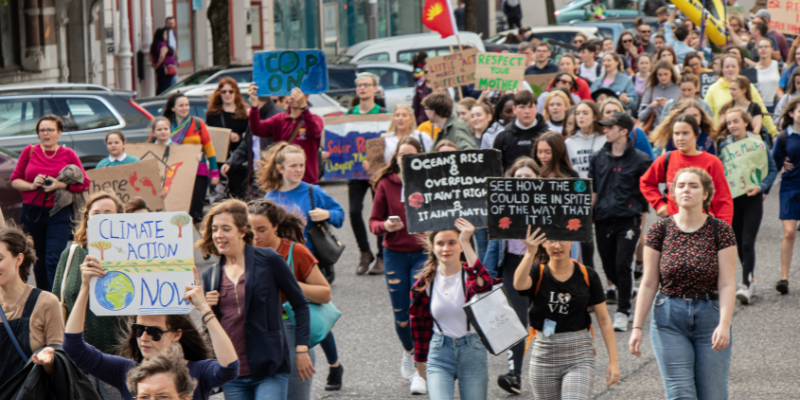In This Section
‘A call for change’: UCC Women’s Studies students on the significance of International Women’s Day

- Sharon Akpofure Riamela and Anna-Katharina Priesterath share their insights on the day's significance, a day that has come to be marked just as frequently with celebration as it is with protest.
- International Women's Day (IWD) is a global day celebrating the social, economic, cultural, and political achievements of women.
As the world marks International Women’s Day, students from the University College Cork’s Masters in Women’s Studies share their perspectives on the day’s significance.
Through their experiences and academic insights, they emphasise the importance of reflection, celebration, and continued advocacy for gender equity.
‘A day to challenge injustice and celebrate resilience’
For Sharon Akpofure Riamela, from Nigeria and recipient of the Roger Casement Fellowship 2024/2025, International Women’s Day is more than a commemoration - it is a call to action. Sharon describes the day as one that shines a global spotlight on the systemic barriers imposed on women, barriers that aim to silence and erase women.
“International Women’s Day is a day set aside to focus the global lens on the multilayered socially constructed barriers placed on the paths of women globally, to silence and make women invisible in our collective world,” Sharon explains.
“It is a day to remember sisters that have been completely silenced and imprisoned by patriarchy, pointing out and challenging societal injustices against women and brainstorming on how we can make it a woman’s world too.”
Sharon views the day as an opportunity to honour the resilience of women who have fought tirelessly for their rights despite societal hostility.
“This day enables us to reflect on the decades-long struggle for women to be given equal rights befitting of every human. A day to journey back in time into women’s history to look at victories won and battles lost - analysing strategies that worked and those that did not,” she states.
Most importantly, she underscores the necessity of solidarity, emphasizing that no right has ever been freely granted to women. “It is a time to remind ourselves that no right has been freely given to us as women; hence, the need to celebrate and strengthen our bond of sisterhood, for our strength lies in our community.”
‘A celebration, a reminder, a call for change’
For Anna-Katharina Priesterath, from Berlin, International Women’s Day holds deep personal significance.
“International Women’s Day has always been a very special holiday for me. Growing up with a Russian family background, I was told that women are celebrated on this day and should receive flowers. Unfortunately, I think we often forget that women should be treated with respect any day of the year.”
Anna-Katharina’s academic research focuses on gender-based violence, intersectionality, and sexism. Her work has reinforced her belief that International Women’s Day is not just about celebration, but also about raising awareness, reflecting on feminist achievements, and fostering community.
“I experienced harassment because of my gender, as have so many women around me. International Women’s Day is not just a celebration but also serves as a reminder. Women are present. We deserve visibility, respect, and equity.”
In Anna’s view, the global nature of the day provides an opportunity to unite across cultures and experiences in the fight against gender-based oppression. “I believe it is crucial to use opportunities such as International Women’s Day to connect with others, raise awareness on ongoing issues, as well as reflect on feminist achievements and build community.”
“Being a woman is a unique experience that cannot be narrowed down to a few words. International Women’s Day is a statement. Although challenges differ across the globe, the initial struggles of gaining freedom of choice remain persistent. By coming together, we can dismantle oppressive patriarchal structures.”
Looking forward: strength in community and advocacy
Whether through challenging patriarchal norms, advocating for equal rights, or strengthening bonds of community, the day serves as a reminder of the work that has been done - and the work that still lies ahead.
At UCC, the Masters in Women’s Studies programme continues to cultivate critical discussions on gender, intersectionality, and feminist activism, ensuring that students like Sharon and Anna-Katharina are equipped with the tools to contribute meaningfully to the global movement for gender equality and emancipation for those marginalised by intersecting structures of oppression.
Director of the UCC’s Women’s Studies MA and PhD programme, Dr Evelien Geerts, underscores the ongoing importance of the intellectual-political project that is women’s and gender studies: “Given the global rise of far-right politics, and that in liaison with an already felt erosion of reproductive rights and an increasingly popular anti-gender movement that singles out the most vulnerable amongst us, we are in dire need of an intersectional feminism that re-politicises.”
“A 'visionary” hope-driven type of feminism that, as critical pedagogue bell hooks also put it, accentuates an ethics of mutuality and compassion for all. Our Women’s Studies MA programme offers students the theoretical, critical literacy, and pedagogical tools to not only analyse what is at stake but also envision and build a more just world for all,” Dr Geerts said.
Learn more about the MA in Women’s Studies
College of Arts, Celtic Studies & Social Sciences
Coláiste na nEalaíon, an Léinn Cheiltigh agus na nEolaíochtaí Sóisialta
Contact us
College Office, Room G31 ,Ground Floor, Block B, O'Rahilly Building, UCC
